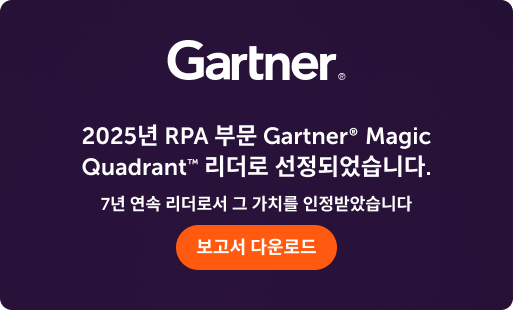- AI
- Automation Anywhere AI
-
- 솔루션
- 제품
- APA(에이전트 프로세스 자동화)
- RPA(로보틱 프로세스 자동화)
- 모든 제품 보기
-
- 리소스
Community Edition 받기자동화 기능을 완비한 클라우드 Community Edition으로 지금 자동화를 무료로 시작하세요.
주요
 2025년 RPA 부문 Gartner® Magic Quadrant™ 리더로 선정되었습니다.7년 연속 리더로서 그 가치를 인정받았습니다 보고서 다운로드 보고서 다운로드
2025년 RPA 부문 Gartner® Magic Quadrant™ 리더로 선정되었습니다.7년 연속 리더로서 그 가치를 인정받았습니다 보고서 다운로드 보고서 다운로드- 전문가 되기
- 개발자 도구
- 지원 받기
- 모든 리소스 보기
-
- 파트너를 만나보세요
- 이벤트 및 웨비나
Back in the day, if you wanted to rob a bank or get money illicitly, you would have to be in close, physical proximity to the cash. Today, when you’re online, those “bank robbers” are in close proximity to billions of people, no matter where they are.
When it comes to web security, privacy is critical and is always under threat from professional hackers.
Can a bot actively stop hackers from phishing?
Robotic Process Automation (RPA) can help your company guard security processes as vigilantly and faithfully as the company doberman. But it's the employee who has the last say and who has to listen to that voice inside his or her head and not open an unfamiliar link.
RPA can be an effective way of keeping corporate digital security guards in the “on” position in case human error happens.
Artificial intelligence (AI)-powered cognitive RPA bots deliver multiple advantages for reducing errors and improving employee productivity and cost savings when compared to the alternatives. Having humans process sensitive information can lead to a range of privacy risks, from intentional data theft to accidental disclosure.
Unlike humans, AI-powered cognitive bots only do what they're told, but they can also learn from the process and can teach other bots. Bots are useful in another way as well: They don’t get tired or need a lunch break. RPA bots can be your firewall, protecting information while reducing risk.
How can bots secure sensitive information?
Artificial intelligence-powered RPA bots can take your disaster readiness to another level. RPA is ideal for compliance and implementing regulations, such as the General Data Protection Regulation (GDPR), that often require uninterrupted access to information.
RPA can also make backup copies of core processes in case the system goes down or needs to be restarted. RPA can easily back up information and quickly access information from off-site places as well, to keep you secure.
Automation can help with compliance for banking or any industry requiring accurate audit trails. For greater proficiency, RPA is capable of recording small or big data actions in a log, even when data leaves the line-of-business application to a web portal or another third-party application. Having every click and data entry logged allows for more complete audit trails.
Eliminate unauthorized accessibility
RPA is also ideal for preventing unauthorized users from accessing and manipulating private data. Secure access is needed to safeguard businesses from employees’ unintentional error, as well as hacker attacks.
How can bots prevent or augment attacks? They:
- Only allow people with login credentials to access sensitive data in the system
- Build the RPA environment customized via Active Directory integration to increase business efficiency
- Add encryption as a means for securing data use — for example, if role-based access reduces internal security risks, encryption helps protect the company from outside malicious attacks
- Establish the RPA center of excellence (CoE) team that collaborates for monitoring scheduled tasks, ensuring protection against malware and Trojans, and enforcing policies that reduce business risk
RPA is your collaborator for minimizing security risks
Although the concept of privacy has changed over time, concerns regarding data and secure access are justifiable in the rapidly advancing global security arena. Mitigating security risks is one of the most important applications of our technology.
RPA is known for reducing the risk for error inherent in the human workforce, and now RPA can secure role-based access to confidential data and provide data encryption.
Increase your business security
while reducing risk.
Gautam Roy 소개
Agentic Process Automation System에 대해 알아보세요.




